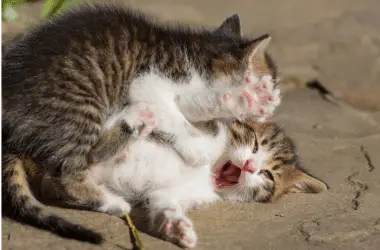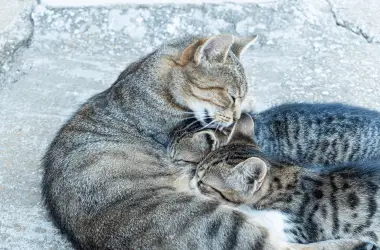Introduction
Have you ever asked yourself, “Why does mom cat bite her kittens?” Cat owners are curious and concerned about the seemingly paradoxical behavior of a mother cat being aggressive toward her own kittens. We examine the subtleties of feline behavior in this investigation in an effort to understand the reason behind mother biting.
Comprehending the motivations behind this conduct not only illuminates the language of cats but also provides cat owners with knowledge to cultivate a peaceful bond between mother and kittens.
Come along on this journey as we unravel the subtleties of cat communication and maternal instincts, offering insightful knowledge that will help us develop a stronger bond with our feline friends.
Table of Contents
II: Why Does Mom Cat Bite her Kittens? Complete Details

Examining the Causes of Mother Biting
Cats are notorious for their mysterious behavior, which frequently leaves us wondering what drives them. A mother cat biting her kittens is the result of a number of factors. The purpose of this section is to give cat owners a thorough understanding of the complexities surrounding maternal biting.
Interaction and Instruction
Interpreting Cat Bites’ Sign Language
Cats use more than just vocalizations to communicate. It’s interesting to note that cats use body language, and biting is one of them. Analyzing the subtleties of feline bites facilitates understanding the messages that moms send to their young offspring.
Teaching Aspect: Kittens as Learners
Mother biting is more than just a means of communication; it’s an essential part of the teaching process. Kittens interpret these bites as lessons from their mothers because they are born with an innate need to learn survival skills.
Comprehending this educational dynamic is crucial for cat owners who want to cultivate a loving atmosphere.
Preventive Actions
Instincts of Mothers: A Mother’s Intent to Preserve
Mother cats are compelled by their maternal instincts to fiercely defend their young. They set boundaries and protect their kittens from danger by biting them. The natural defense mechanisms that are ingrained in a mother cat’s behavior are examined in this section.
The Reasons Mother Cats Snatch Mice by the Neck
Mother cats’ propensity to grab their kittens by the neck is one of the fascinating aspects of maternal biting.
Analyzing the causes of this particular behavior provides insights into feline instincts and the extent a mother cat will go to protect her offspring.
Through exploring the various facets of mother biting, cat owners can develop a deep understanding of the complex ways that mother cats interact with, instruct, and shield their kittens.
This information forms the basis for fostering an environment of understanding and support within the feline family.
III: Various Kinds of Mother Bite
Examining Particular Behaviors
Determining a mother cat’s intentions and reactions requires an understanding of the different kinds of maternal bites. This section delves into the unique behaviors linked to maternal biting, providing insight into the complex realm of feline interactions.
Why Do Mother Cats Bite the Necks of Their Kittens?

Analyzing the Importance of Biting One’s Neck
Of all the various kinds of maternal bites, neck biting is especially important. Mother cats frequently grab their kittens by the neck, raising concerns about why they do this. The significance of neck biting in communication and caregiving is highlighted in this subsection’s analysis of maternal behavior.
Distinguishing Between Bite Types
Maternal bites are not all the same. While some may communicate a sense of discipline, others may offer gentle guidance. Knowing the subtle differences between the different types of bites enables cat owners to accurately assess the intentions of their feline companion.
It is possible to create an environment that is beneficial for the mother cat and her kittens by differentiating between these behaviors.
With all of its variations, maternal biting illustrates how complex feline relationships are. By scrutinizing the distinct behaviors linked to maternal bites, feline owners can acquire significant understanding into the workings of the mother-kitten bond.
Equipped with this understanding, they can establish a setting that fosters constructive dialogue and comprehension among feline members of the family.
IV: Comprehending Mother Cat Aggression
Examining Angry Conduct
Although mother cats’ aggression toward their kittens may seem strange, it is a complicated part of feline behavior that needs to be investigated. In an effort to help worried cat owners understand the causes of maternal aggression, we explore these causes in this section.
Why Does My Cat Treat Her Kittens Aggressively?
In order to establish a safe and nurturing environment for their cats, cat owners must be aware of the triggers that lead to maternal aggression.
This subsection looks at possible causes of a mother cat’s aggression toward her kittens, providing information on elements that might support this seemingly contradictory behavior.
What Causes Maternal Cats to Growl at Their Young?
A common vocal expression linked to aggression is growling. Raising doubts about the nature of this communication, it is released by a mother cat in the direction of her kittens.
This section investigates the causes of growling in the context of mothers, interpreting the subtle messages and their applicability to the dynamics of the feline family.
Interpreting Angry Behaviors: Biting and Beyond
A mother’s aggression can take many forms, and biting is just one of them. This section attempts to explain aggressive behaviors other than biting, giving cat owners a thorough grasp of the spectrum of behaviors connected to maternal aggression.
Maternal aggression must be understood in order to provide a safe environment for mother cats and their kittens.
Through addressing the underlying causes and understanding the different ways that aggression manifests itself, cat owners can endeavor to create an environment that supports the general harmony and well-being of the feline family.
V: Training and Instincts of Mothers
Mother cats’ pedagogical function
Kitten behavior is largely shaped by maternal instincts, and the role of a mother cat as an educator is crucial to their growth. This section delves into the importance of maternal training and explains how mother cats teach their young vital life skills.
The innate instincts of kittens
Kittens are born with natural instincts, which are refined for survival under the guidance of their mother cat. This section looks at the natural behaviors kittens display and how a mother cat develops and honed these instincts through different interactions, readying her young for life outside the nest.
Mom Cat’s Function in Passing Down Hunting Knowledge
Teaching kittens to hunt is one of the core components of maternal training. Mother cats impart the necessary life skills through play, role-playing hunting scenarios, and, occasionally, light biting.
This portion of the chapter explores the intriguing field of feline hunting education and clarifies the strategies mom cats use to get ready for the challenges of the outside world.
Techniques for Quitting Overbiting
Although biting by mothers is a normal part of teaching, biting too much can be problematic. This subsection provides cat owners with doable strategies to step in and redirect their mothers’ biting behaviors when they become excessively aggressive.
Cat owners can strike a balance between allowing maternal teaching and making sure the mother cat and her kittens are both healthy by putting these strategies into practice.
Cat owners can actively support their feline companions’ natural development by learning about the teaching role of mother cats and the instincts they help nurture in their kittens.
In order to ensure a peaceful environment for the mother cat and her developing offspring, this section offers insightful information on the delicate balance of maternal training.
VI: Useful Advice for Cat Owners
Developing a Positive Mother-Kitten Bond
Cat owners need to take the initiative to create a nurturing environment for both mother cats and their kittens. This section offers helpful advice on how to promote a positive mother-kitten bond for the sake of the whole feline family.
Practical Advice for Cat Owners
Creating a Calm and Secure Environment
It’s critical to provide the mother cat and her kittens a quiet, safe space during the early stages of motherhood. This subsection provides suggestions for setting up a home where the mother can confidently and stress-free care for her children.
Observing Mother Conduct
Cat owners must pay close attention to and comprehend the behavior of the mother cat. This subsection helps cat owners identify potential problems or signs of distress early on by offering insights into important behaviors to watch out for.
Supplying Sufficient Resources
Providing ample resources, such as food, water, and a cozy nesting spot, helps to create a stress-free atmosphere for mom cats and their young. The significance of providing for these fundamental requirements for the welfare of the whole feline family is discussed in this section.
Strategies to Consider in Order to Quit Overbiting
Distinguishing Between Normative and Abnormal Biting
It’s critical to understand the line that separates appropriate maternal biting from overly aggressive behavior. Cat owners can use the guidelines in this subsection to differentiate between these behaviors and take appropriate action when needed.
Applying Positive Discipline
A useful strategy for changing behavior is positive reinforcement. Cat owners are introduced to the idea of positive reinforcement in this section, which aims to deter excessive biting and promote desired behaviors.
Getting Expert Guidance
It is critical to seek professional assistance if maternal biting becomes a chronic problem. The significance of seeking advice from a licensed animal behaviorist or veterinarian in order to address underlying issues and put practical solutions in place is emphasized in this subsection.
Cat owners can help create a healthy and encouraging environment for mother cats and their kittens by implementing these helpful suggestions into their routine.
Maintaining a positive relationship between a mother and her kitten calls for awareness, compassion, and initiative to deal with possible problems and protect the welfare of the cat family.
Conclusion
In unraveling the intricate dynamics of feline behavior, the question “Why does mom cat bite her kittens?” has guided us through a journey of understanding, empathy, and proactive care. Our exploration into the multifaceted world of maternal biting has illuminated the nuanced language of cat communication, the teaching role of mother cats, and the protective instincts that drive seemingly aggressive behaviors.
As we conclude, it is evident that the key to nurturing a harmonious relationship within the feline family lies in recognizing the motives behind maternal biting and actively engaging in fostering a supportive environment. Armed with insights into the delicate balance of teaching, the importance of positive reinforcement, and the necessity of seeking professional advice when needed, cat owners are equipped to navigate the complexities of maternal behavior. Ultimately, the journey of understanding “Why does mom cat bite her kittens?” transcends curiosity, offering a pathway to enriched connections and a flourishing feline family life.
FAQS: Why Does Mom Cat Bite Her Kittens?
1. Why is my cat aggressively licking her kittens?
When your cat vigorously licks her kittens, it can be worrisome. There are some reasons for this behaviour;
- Establishing Dominance and Maternal Roles
- Fostering Grooming and Bonding
- Transferring Scent
- Expressing Affection
Keep in mind that licking, particularly if it results in patches, may signal stress, allergies or health problems. If you’re worried, seek advice from a vet.
2. Can a mother cat reject her kittens?
Outdoor or stray mother cats may scatter their kittens to avoid predation, and if they seem well-fed and safe, the mother may be nearby. They may reject sick kittens to prevent spreading illness, and removing completely rejected kittens is recommended.
Some nursing mothers may develop mastitis, an infection of the mammary gland, leading to rejection. Large litter sizes can also lead to rejection.


